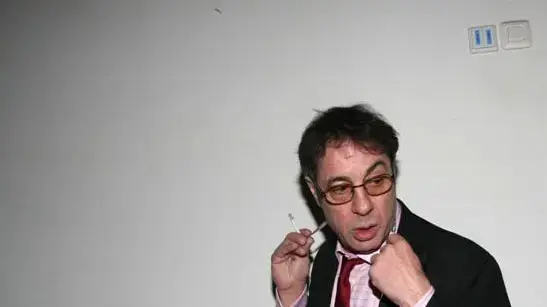"It's strange when famous people die, and it
doesn't matter if they fought in the good war or the bad.
It's strange when famous people die,
both when we like them and when we don't.
They're like familiar buildings in old streets,
like things and places we've gotten used to,
and we just accept them Because they are there...
the trouble with famous people is
that you always have to replace them
and you can't always find replacements for them,
and that's what makes us this special sad."
- Charles Bukowski, Hebrew: Jonathan Geffen
My love story with Jonathan Geffen started even before I knew who Jonathan Geffen was.
My grandmother took me to see "The 16th Lamb" at the old Camry Theater on the corner of Dizengoff and Frishman streets in Tel Aviv, and I, a child who doesn't understand anything about his life, fell in love.
I didn't know who the father was who recited the words on stage, and of course I didn't know concepts like "spoken word", but I fell in love.
At home we had the record of the show and I listened to it over and over and over, until I knew Michael Jackson.
But that's another story to be told another time.
In the army I fell in love with him all over again.
I don't remember what the trigger was, but after I discovered Bob Dylan, Lenny Bruce, George Carlin, Bill Hicks, Richard Pryor and other people who shaped my consciousness - I discovered someone who did it at the same time as them, and in my favorite language.
Sometimes he copied from them shamelessly, but it was in the "end justifies the means" way.
There is no doubt at all that the people living in Zion, especially he, should know "Who is a Jew?"
of Lenny Bruce.
And if there is anyone who knew how to correctly translate into Hebrew the self-love stories of Tom Waits - it was Jonathan Geffen.
The closest to doing Bob Dylan in Hebrew.
Jonathan Geffen (Photo: Reuven Castro)
He is a poet.
This is the advantage he has over all songwriters and rhymers.
When he writes a chorus - it's a song with an atmosphere and exposure of lyrical details that are usually hidden in other choruses under a modest melody or moral.
For me, he is singing as I was I want to understand and love.
The singer, the laugher, the salty, the innkeeper, the bartender and his daughter.
A special language composed as if of people who are not of this world, who are, nevertheless, tangible and clear to us as the sun.
To present it you need to understand the atmosphere and the celebration in the words.
The satire that is always, somehow, a love song, and the love songs that always, in some way, are overcome by sadness over the joy of the poor and the rich.
I sign every word written in the previous paragraph, even though I didn't write it.
These words were written by the journalist Jonathan Geffen in the Ma'ariv newspaper in June 1969, about the revered poet Natan Alterman.
This is the same Nathan Alterman who will spur the young man of words to write down his poems, and will fall asleep into a glass of cognac at the Kasit cafe.
But when Jonathan Geffen complimented his favorite poet, he was actually writing about himself.
It's not a matter of ego or lack of awareness, he just didn't realize he was ahead of his time.
He was a songwriter, and a writer, and a translator, and a satirist, and a TV show host, and an author of children's books, and a journalist, and a publicist, and an editor, and a screenwriter, and a playwright, and a comedian, and a nephew of, and a father of.
However, more than anything, he was a poet.
This, as mentioned, was the advantage he had over all the other chanters.
A poet in every inch of his limbs. A poet when he sat in front of the paper, a poet when he wrote for children, a poet when he raved about politics, a poet when he looked deeply into the glass of the drink, a poet when he personally imported Lenny Bruce to the Holy Land (and also imported George Carlin and Tom Waits for the convenience of the people who live in Zion), a poet when he made love with the Hebrew language, and made it more alive than ever, sexy and kicking, without discounting it for a moment. A poet when he looked at his beloved land from the outside, a poet when he realized he couldn't live without it. A poet that his words raised an entire generation of children, who grew up and raised another entire generation on his songs, and God forbid.
Jonathan Geffen's body of work is so diverse and deep, and he is the author of some of the greatest poems ever written here - but even if he had only written the book "The 16th Lamb", he would still be considered one of the greatest writers in Jewish history.
Geffen's children's songs still work, despite the changed world around them.
There is no longer any place in Ramat Gan where you can stand and smell chocolate;
Today's girls aspire to be scientists, and are not satisfied with being "the prettiest girl in kindergarten";
But the wonderful truth that remained in "I love chocolate" (with the melody of Yitzhak Kleftar, who also left us recently) transcends times and truths.
The unapologetic simplicity of "But most of all, I love me" surprises every time with its honest simplicity.
This is not another children's song, it is one of the most beautiful hymns ever written in Hebrew.
This is related to the fact that there was no creator who understood Israeli children more than Jonathan Geffen.
There was no creator who knew how to convey this simplicity to the reporter in such a perfect way.
This was true in the seventies of the last century, and it is still true today.
What a timeless piece.
Just before the corona came to visit us and stopped the world of culture, I managed to take my eldest daughter, then three and a half years old, to a concert by Yonatan Gefen.
He took the stage with a large cowboy hat that hides white hair that seems incongruous with the fact that he is an eternal child.
hyper boy
sleepy boy
A boy who stutters a bit and is very short, but mostly a boy.
Maybe that's why I fell in love with him as a child.
Maybe that's why my daughter fell in love with him too.
how can you not.
Even after the age of 70, he was still a child, and spiced up the familiar songs with stories that made the whole experience unforgettable.
Next to Jonathan sat Mika Karni, who performed "The most beautiful girl in the garden" in an intimate and quiet version, as God intended.
At the end of the song Jonathan turned to all the beautiful kindergarten girls in the hall and said: "Did your parents say that's why I wrote this song about you? It's true."
It is said that he was 76 years old when he died, but his soul was that of a child.
"Hello now, hello in the fall, hello Enoch."
Yonatan Gefen and Shalom Hanoch (Photo: Flash 90, Moshe Shai)
At the beginning of his book "The Second Israel", Avishai Ben Haim maliciously accused Yonatan Gefen of having written "It may be over" as a lament lamenting the loss of the hegemony of the first Israel after the revolution of 1977.
The fact that the song was published four years before Begin came to power did not prevent Ben Haim from basing his false thesis on the words of the song that Geffen wrote for Eric Einstein.
Moreover, Dr. Ben Haim managed quite amazingly to miss the ironic tone of the song, in which Gefen treats with disdain the nostalgic ideals of the generation that preceded him. Gefen's genius erupts already in the first line of the song - "They say there was a happy place before I was born/ and everything was "Simply wonderful until I arrived" - all of which is a parody of the founding generation. The truth is that this is a timeless line. It was suitable for the children of 1973, just as it is suitable for the children of 2023. How twisted do you have to be to hear this lament in the stinging words?
Geffen passed away while the valley train continues to run fast, without stops or stops.
When he was asked in the 1990s why he returned to Israel from exile in London, he explained that patients cannot be outside the institution for too long, and only here know how to treat us when we start going crazy.
"What is love if not one big madness", he signed this psychic love song to this country he called "home", to which he aspired to travel, take a train, an airplane, a backpack and a cane.
And, even though the Channel 14 news broadcast blatantly ignored his existence even on the day of his death, he was a Jew who loved Israel no less than them.
Probably more.
He fought in the paratroopers for the country, and continued to fight for its character and identity throughout his life.
Not respecting the legacy of Yonatan Gefen is spitting in Israel's face.
He had a lot of criticism of the country, and especially of its leaders - but he believed in it and its idea.
Few have managed to distill the stock-depression feeling of this country into words as Geffen did.
"Country blues", he used to call it.
He said that he once came to a school to read from his stories to the students, and one of them asked him what was the hardest moment in a child's life.
His answer was that the hardest moment for any child is the moment you find out that someone might not love you.
This is how he explained the attitude of the State of Israel to its critics.
A country that is sure it is the cutest in the world, and throws a tantrum at every shred of criticism.
He was proud that even children in the settlements hear his songs.
Jonathan Geffen (Photo: Reuven Castro)
Geffen was also not afraid to bite the hand that feeds him, and sent many of his arrows of criticism towards the local media.
"I may not be a great Israeli journalist, but I'm not a damn chameleon either," he wrote in one of his columns, "I don't write for investors or editors. I write for my readers."
Long before social networks and professional mind engineers entered the arena, Geffen already understood how words can create reality.
"An 11-year-old Arab boy died from a rubber bullet or whatever in Nablus, or wherever, and the nice announcer with the tie says: 'A young Arab was killed when he tried to throw stones, etc. 11 years old and already young and already dead,'" he wrote sadly, And explained that the more the Israelis get used to ignoring the pain of children in the territories, the more slowly they will get used to being less excited about their children.
"The virus is not only a virus of the tongue, but also the virus of the soul, the soul that should feel or at least try to feel the other."
He grew up under the shadow of his uncle Moshe Dayan, but precisely from the militaristic habitat in Nahalel grew one of the fiercest and most important opponents of the occupation of the leftist camp for generations.
He believed in the Declaration of Independence, but did not think it should come at the expense of the independence of our neighbors.
In the past he argued that instead of moving from Memorial Day to Independence Day, one should continue from Memorial Day to the search for a solution day.
It's not just a successful rhyme, it was a way of life for him.
He believed in a solution not only to the outside, but also to the internal Israeli rift.
He told proudly about "the four-year-old settler boy in Ariel who sang from the 16th song of the sheep", and emphasized that the boy "is not to blame that his grandfather was sent by Shimon Peres to Sebastia".
When he was awarded the Lifetime Achievement Award by AM alongside Ariel Zilber, he was asked to boycott the ceremony because of Zilber's views. Geffen didn't even hesitate. He came to the ceremony and said from the stage: "I can strongly oppose Ariel Zilber's views and want to strangle him - and I Might as well love him.
This does not contradict.
Dialogue is always more important than any boycott."
It will be good, yes.
Yonatan Gefen (photo: Walla! NEWS system, Aya Ephraim)
Jonathan Geffen's voice will be speechless not only because of the sound of his words, but also because of their deepness.
The reminder that sometimes the most important thing is the most trite thing that no one says.
"It will be good", he wrote in a hymn composed by David Broza under the self-conscious name "Shir Shalom No. 349/A".
The prophetic optimism of the line "Go ahead, just get out of the territories" has since been replaced by Leibowitzian pessimism.
The lyrics of the song have also changed over the years.
Houses were added on corruption, on the cost of living - and just recently an optimistic house on love was added.
will be good, yes?
Death, in its most banal version, was present quite a bit in his work.
No pathos, no drama.
His "little prince" isn't dead, he just won't see a sheep eating a flower again.
He didn't like that the song, written about a soldier who served alongside him and was killed in training by an accidental gunshot, became a Memorial Day anthem.
"The Little Prince should be reminiscent of life. It's a shame they don't sing it on Valentine's Day, for example," he wrote.
It is difficult to estimate how many children were first exposed to death precisely in Gefen's first book of children's poems, "Songs that Anat loves especially", where he wrote simply about his own orphanhood, through the eyes of his little sister.
Under the very appropriate title, "Sad Song", Geffen explains to children with almost surgical sensitivity the daily pain of losing a parent at a young age.
Later he will explain that loneliness makes people hard, and few come out of it hired.
Some are afraid of silence, some discover a soul in it.
Nobody writes songs like this anymore.
Not for children, not for adults.
I doubt anyone can.
In another country, which sanctifies culture and art, a day of mourning would be declared.
maybe a week
In our country, the prime minister didn't even bother to issue a lacon message to the nation about the death of one of the greatest Jewish writers of the last hundred years.
Those who sign works that are cross-sector consensus.
Ironically, it could be that this silence is exactly what Jonathan would have wanted from the leaders of the country he loved so much, in his unique way.
"Jews have no rest," he once wrote, "even our dead are put to death... even there they look for us, and your paranoia does not stop when life stops, and you are always running away, always hiding, always a Jew."
culture
on the agenda
Tags
Jonathan Geffen















